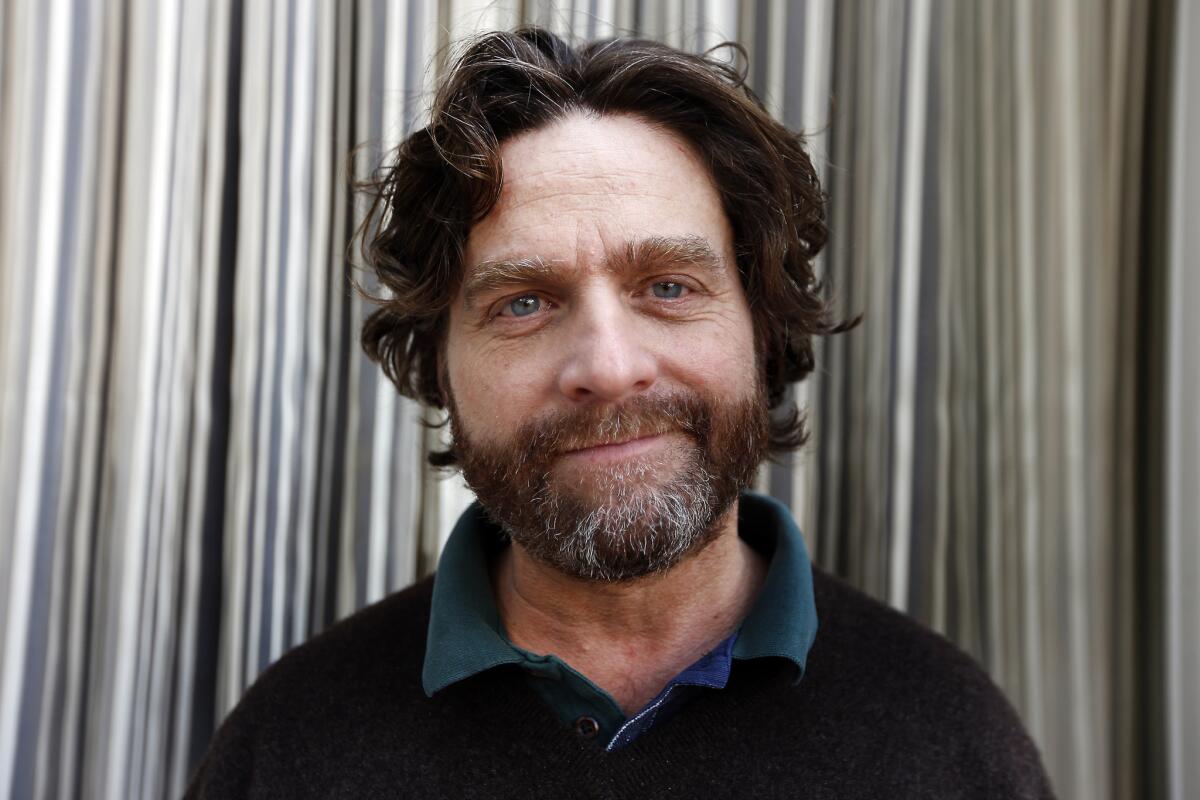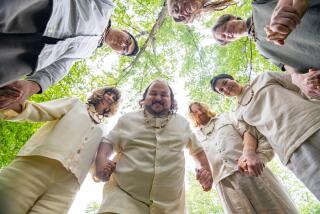Q&A: With movie comedies ‘a little bit one-note,’ Zach Galifianakis tackles TV

Portrait of Zach Galifianakis at The Langham Huntington in Pasadena, Calif. on Jan. 16, 2016.
Before he became the star of the billion-dollar “Hangover” franchise, Zach Galifianakis was the bearded patron saint of the alt-comedy world. Now the North Carolina native, who interviewed President Obama in 2014 on his mock talk show “Between Two Ferns,” is returning to his oddball roots with “Baskets,” an FX comedy about a disgruntled clown with the unlikely name of Chip Baskets. After dropping out of a prestigious clown academy in Paris, Chip moves back home to Bakersfield, finds work as a rodeo clown and clashes with his overbearing, judgmental mother, played by Louie Anderson (no, that’s not a misprint).
See more of Entertainment’s top stories on Facebook >>
Martha Kelly, a comic who used to drive Galifianakis home from gigs in his pre-fame days, gives a wonderfully deadpan performance as Martha, an insurance claims adjuster who is inexplicably determined to befriend Chip. “I wanted to play an angry kind of guy in a non-edgy show,” Galifianakis, 46, says of the surreal and strangely sweet “Baskets,” which was co-created by Louis CK (writer and star of “Louie”) and Jonathan Krisel (director and executive producer of “Portlandia”).
A lot of people are creeped out by clowns. Where do you stand?
I have a sympathy for clowns. Baskets is not a creepy clown, he’s an angry clown, and I think there’s a huge difference. He may be creepy just because people think I’m creepy.
Do you have any training as a clown or in mime?
No, but when I was a kid I was fascinated by Shields and Yarnell, which was this mime duo on television. I was really drawn to that kind of physicality. Baskets is a bad clown, so you don’t have to do too much of that. If I were a good clown I’d probably have to do more of it. I bought a unicycle right when we started writing the show, but [learning how to ride] is a two-week commitment. I didn’t have the patience. I can’t juggle. I can’t do anything. I can fall down. That’s what I can do.
What made you turn to TV from the movies? Did you feel like there was more room to try something different?
That seems like the usual story these days, and I think it’s kind of true. The movie comedy business is a little bit one-note right now. It would be hard to do something like “Baskets” in a movie. I think a lot of Wall Street guys started getting involved in the movie business to be honest.… TV somehow filled the void.
But you were in “The Hangover” movies, which were pretty broad, at least compared to “Baskets.”
Especially with the first one, I think it was enough of a shift a little bit that it was interesting. Plus it was no-names in it, and I think people wanted to root for that kind of movie. There’s room for all that stuff. The older I get, I’m like, it’s all good, there’s different taste out there.

You’d been working for a long time when “The Hangover” suddenly made you famous. Was that weird for you?
It just makes me uncomfortable to talk about because the lifestyle I think people think one lives and the whole machine of Hollywood — it’s not for me, whatever that is. I just like to work, and I’m incredibly grateful. I used to tell diarrhea jokes in cafes in Culver City. That is still me. I can’t escape that person.
How did you decide to cast Louie Anderson as your mother?
I had reached out to Brenda Blethyn, because I knew that Mike Leigh used improv in his movies. She wasn’t available — or at least that was her excuse. So Louis [CK] and I were talking about it. It’s a voice that I kept hearing, and I imitated the voice. And he was like, “You mean like Louie Anderson’s voice?” And I said yes. And he said, “Can we call him?” And five minutes later, he was cast. To me he steals the show. He is heartbreakingly good.
Was there any hesitation, since he’s not a woman?
I’m certainly sensitive to those things, but I think when it’s not done in a cartoonish way, hopefully people see it as just kind of a quirky artistic choice. The first person I wanted was a woman, but sometimes you just get inspired in a different way and you just run with it. You don’t really sit back and think about weird consequences. It wasn’t an anti-woman decision.
Has hosting “Between Two Ferns” changed your perspective at all on talk shows?
The talk show I put online is kind of its own attack on talk shows, but it’s also so one-note. I don’t know what else to do with “Between Two Ferns.” It’s kind of run its course a bit.
Well, once you’ve interviewed the president, what else is left?
That’s my point.
Is there anyone left you’d like to have on the show?
The pope would be nice, as long as you’re talking about a “good get,” as they say in the biz. I’ve got to put that on my things to do: hit up the pope.
Was it hard for you to stay in character when you were talking to Obama?
I think that was the only way to do it, and to hold back would have cheapened the result. Even though it is the president of the United States, you hope that he is aware of the show, but I wasn’t 100% sure that he knew about it, and that added to my nerves a bit. A lot of D.C. people are not funny, they just aren’t, and the president — I think one of the reasons there’s such a jealousy of him — he has this humor about him. He just rolled with it.
In 1972, your uncle Nick Galifianakis ran for the Senate against Jesse Helms and lost.
It was one of the earlier cases of political mudslinging. [Helms used the campaign slogan, “He’s one of us.”] Being in the South with a weird name like that … you know, people are territorial. You feel closer to that kind of insult in the political world when you know your family’s been involved. It was an anti-immigrant type of thing, to be honest with you. We keep repeating these mistakes. It’s just sad.
Was your family political?
We always had connections to politics and also discussed it in our house a lot. That’s just what Greeks do. My brother and I volunteered for the Dukakis campaign [in 1988], and we would do phone calls. We would sit next to each other and say his last name and our last name and we would giggle. It just sounded like two guys talking about dinosaurs. That [election] was heartbreaking too because of the whole Willie Horton thing. That was not a high point in American politics.
Do you still feel attached to the South?
I miss the South. It just has a very rough, layered, shameful history that makes it a very complicated, beautiful place now. There’s more mingling of blacks and whites in the South than there are in these liberal cities — and I consider myself a liberal. There’s more to it than our history. A lot of us have rejected that history, have nothing to do with that. There’s a lot of good people in the South, and a lot of the South is ignored. The Appalachian mountains are completely ignored. People need help. I could bore you for five more hours of this.
More to Read
The complete guide to home viewing
Get Screen Gab for everything about the TV shows and streaming movies everyone’s talking about.
You may occasionally receive promotional content from the Los Angeles Times.






